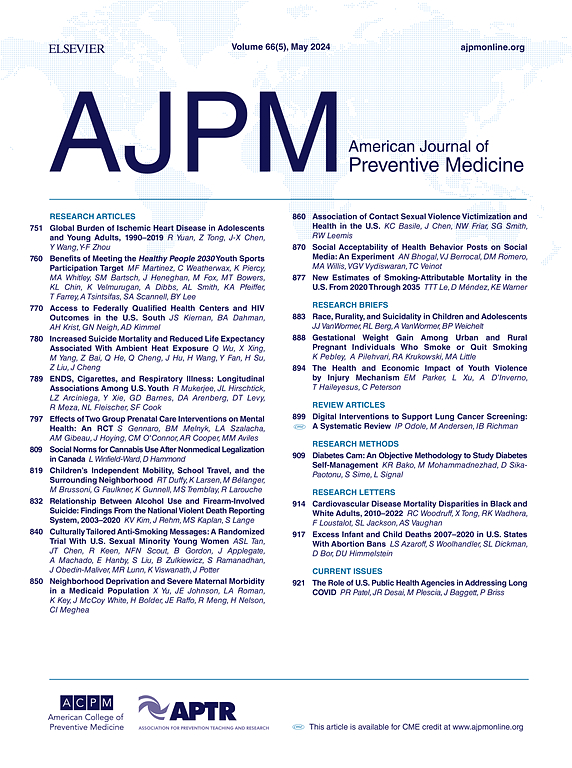Alcohol, Smoking, and Their Synergy as Risk Factors for Incident Type 2 Diabetes
IF 4.5
2区 医学
Q1 MEDICINE, GENERAL & INTERNAL
引用次数: 0
Abstract
Introduction
Smoking has been independently related to an increased risk of Type 2 diabetes, whereas the role of alcohol remains controversial. The joint impact of tobacco and alcohol use on Type 2 diabetes risk is understudied. This study investigated individual and combined effects of smoking and alcohol on Type 2 diabetes risk.
Methods
Data from 110,076 participants in the NutriNet-Santé cohort (2009–2023), who were free from Type 2 diabetes at baseline and with alcohol and smoking data, were analyzed. Multivariable Cox regression models assessed the association of alcohol consumption (<2 vs ≥2 portions/day, <10 vs ≥10 portions/week, grams/day of ethanol) and smoking (never versus former/current smoking) with Type 2 diabetes risk. Combined effects of heavy smoking (≥20 cigarettes/day) and heavy drinking (>8 and >15 portions/week for women and men, respectively) were also evaluated.
Results
Over 7.5 years of follow-up (820,470 person-years), 1,175 Type 2 diabetes cases were identified. Alcohol consumption, including heavy intake, was not significantly associated with Type 2 diabetes risk. People who formerly or currently smoke had a 36% higher risk of Type 2 diabetes than people who have never smoked (hazard ratio=1.36; 95% CI=1.20, 1.53). Those who smoked heavily had over twice the risk of those who smoked lightly or moderately (hazard ratio=2.10; 95% CI=1.46, 3.02). Combined exposure to smoking and heavy alcohol use did not significantly increase Type 2 diabetes risk (hazard ratio=1.11; 95% CI=0.95, 1.29).
Conclusions
These findings support smoking as an independent risk factor for Type 2 diabetes and show that alcohol consumption did not confer protection. The combined effect of alcohol and tobacco use on Type 2 diabetes risk and the mechanisms behind this relationship should be further explored.
Trial registration
This trial is registered at NCT03335644 at ClinicalTrials.gov.
酒精、吸烟及其协同作用是2型糖尿病发生的危险因素。
吸烟与2型糖尿病(T2D)风险增加独立相关,而酒精的作用仍有争议。烟草和酒精使用对T2D风险的共同影响尚未得到充分研究。这项研究调查了吸烟和酒精对T2D风险的单独和联合影响。方法:分析来自nutrinet - sant队列(2009-2023)的110076名参与者的数据,这些参与者在基线时没有T2D,并且有酒精和吸烟数据。多变量Cox回归模型评估了酒精消费量(女性和男性分别为每周8份和15份)的相关性。结果:超过7.5年的随访(820,470人年),确定了1,175例T2D病例。酒精消费,包括大量饮酒,与T2D风险没有显著关联。与从不吸烟的人相比,曾经吸烟或目前吸烟的人患T2D的风险高36% (HR: 1.36;95% ci: 1.20-1.53)。重度吸烟者的风险是轻度或中度吸烟者的两倍多(HR: 2.10;95% ci: 1.46-3.02)。吸烟和大量饮酒的联合暴露没有显著增加T2D风险(HR 1.11;95% ci: 0.95-1.29)。结论:这些发现支持吸烟是T2D的独立危险因素,并表明饮酒不能提供保护。酒精和烟草使用对T2D风险的综合影响以及这种关系背后的机制应进一步探讨。临床试验注册NCT03335644。
本文章由计算机程序翻译,如有差异,请以英文原文为准。
求助全文
约1分钟内获得全文
求助全文
来源期刊

American Journal of Preventive Medicine
医学-公共卫生、环境卫生与职业卫生
CiteScore
8.60
自引率
1.80%
发文量
395
审稿时长
32 days
期刊介绍:
The American Journal of Preventive Medicine is the official journal of the American College of Preventive Medicine and the Association for Prevention Teaching and Research. It publishes articles in the areas of prevention research, teaching, practice and policy. Original research is published on interventions aimed at the prevention of chronic and acute disease and the promotion of individual and community health.
Of particular emphasis are papers that address the primary and secondary prevention of important clinical, behavioral and public health issues such as injury and violence, infectious disease, women''s health, smoking, sedentary behaviors and physical activity, nutrition, diabetes, obesity, and substance use disorders. Papers also address educational initiatives aimed at improving the ability of health professionals to provide effective clinical prevention and public health services. Papers on health services research pertinent to prevention and public health are also published. The journal also publishes official policy statements from the two co-sponsoring organizations, review articles, media reviews, and editorials. Finally, the journal periodically publishes supplements and special theme issues devoted to areas of current interest to the prevention community.
 求助内容:
求助内容: 应助结果提醒方式:
应助结果提醒方式:


